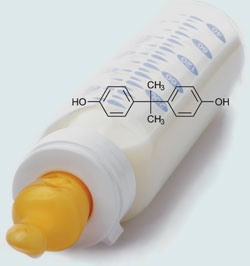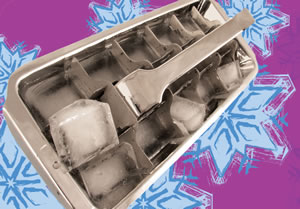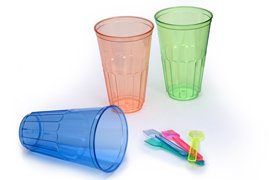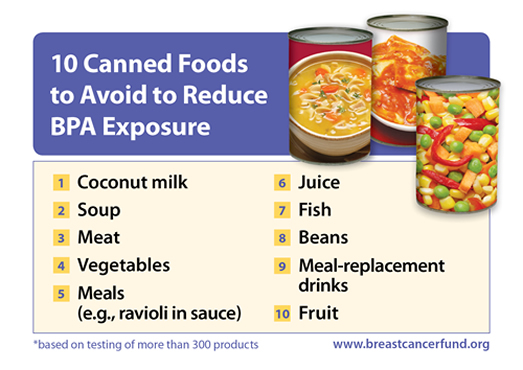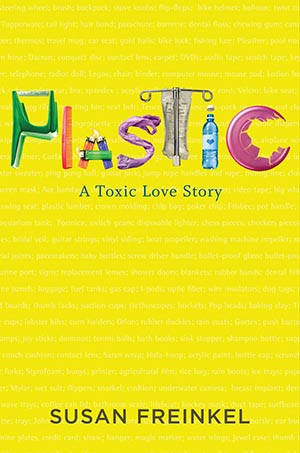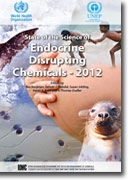15 January 2010 — Despite growing evidence to the contrary, the U.S. Food and Drug Administration (FDA) has long held that bisphenol A (BPA) – used to make the hard, clear plastic polycarbonate – is safe even when indirectly ingested via plastic baby bottles or canned food linings. This has now changed as the government begins to raise flags about BPA.
Ice Without Plastic!
19 July 2010 — The long-awaited Sanctus Mundo ice cube tray is finally here! We know it’s well-made and it has been tested to ensure it is safe and toxin-free. It’s modelled after those aluminum beauties from the fifties, but has been made to exacting modern standards out of the highest quality 304, 18-8 stainless steel – no aluminum here! It also works beautifully for freezing baby food, pesto, juice – lots of room for creativity. And the pull lever folds snugly down into the mechanism so you can stack the tray and save valuable space in the freezer.
Babies put plastic in the mouth hundreds of times a day
21 November 2010 — As the holiday season fast approaches, it is good to be reminded how much plastic is given and received, and especially destined for children and babies. Because babies tend to put everything into their mouth at the beginning of their life-long world discovery process, it is particularly important to select toys that are not toxic. All plastics contain synthetic chemicals. There is no such thing as a pure plastic without any additives.
Most Plastic Products Release Estrogenic Chemicals
11 March 2011 — What we have long suspected – and one of the key reasons we began this company as a precautionary measure – is beginning to be confirmed. Most plastics leach hormone-mimicking chemicals. A study released online by the peer-reviewed journal Environmental Health Perspectives on 2 March 2011 is entitled just that: Most Plastic Products Release Estrogenic Chemicals.
The study authors assessed over 450 plastic products from stores like WalMart and Whole Foods to determine whether commercially available plastic resins and products, including baby bottles and other products advertised as bisphenol A-free, release chemicals that mimic the hormone estrogen. The results are stunning: Almost all commercially available plastic products sampled, independent of the type of resin, product, or retail source, leached chemicals having reliably-detectable estrogenic activity, including those advertised as BPA-free — and in some cases, BPA-free products released chemicals having even more hormone activity than BPA-containing products!
Food Packaging Increases Exposure to BPA and Key Phthalate: Human Study
30 March 2011 — A groundbreaking peer-reviewed study by the Breast Cancer Fund (BCF) and the Silent Spring Institute (SSI) on the effects of plastic food packaging was announced today, and has been published in the journal Environmental Health Perspectives. It is entitled: Food Packaging and Bisphenol A and Bis(2-Ethylhexyl) Phthalate Exposure: Findings from a Dietary Intervention. Laboratory studies with animals have link endocrine disruptors, including bisphenol A (BPA) and phthalates, to various adverse health effects, but this appears to be the first peer-reviewed study involving human test subjects.
The researchers provided five San Francisco Bay Area families with three days worth of fresh organic food – stored only in glass, not canned or packaged in plastic – and the family members also avoided packaged foods prepared outside the home. The families were tested before, during and after eating the fresh food for three days, and the results were stunning. Their levels of endocrine disruptors decreased dramatically, in particular bisphenol A (BPA), which showed a 60% decrease, and Bis(2-Ethyhexyl) Phthalate (DEHP), a 50% dip. The upshot: Decrease your exposure to plastic packaging and you decrease your intake of endocrine disruptors.
Happy Earth Day! Do you have a toxic love for plastic?
22 April 2011 — As we often say, we consider every day Earth Day. But it’s a powerful thing to have one day of the year when Mother Earth is celebrated more intensely and by so many worldwide simultaneously.
On this Earth Day, we have chosen to highlight an important new book released this week – Plastic: A Toxic Love Story – that focuses on our societal relationship with plastic, and some of the fundamental ways this complex, colorful, and, yes, often toxic substance has impacted the world and each person in it. Seasoned journalist Susan Freinkel shares reflections on her personal relationship with plastic by guiding the reader through the history and life cycles of a cast of characters we can likely all relate to in some way: a comb, chair, Frisbee, medical IV bag, disposable lighter, grocery bag, soda bottle, and credit card. Engagingly written and scrupulously researched, the book is sure to open many eyes, and elicit many exclamations of, ‘Wow, I had no idea!’
Plastic-Free Food Wrap Made of Beeswax
21 November 2012 — Foster a new symbiotic relationship with the bees using this plastic-free re-usable food wrap made of a blend of cotton and hemp canvas impregnated with beeswax, jojoba oil and tree resin. You can use it to cover your left over food in glass, ceramic or stainless steel containers. Or to package a sandwich or a light dry snack.
Simply use the warmth of your hands and some gentle pressure to shape the wrap around your food or dishes to protect. The flat will stiffen as it cools.
We are introducing 4 different food wrapping products
Serious Health Effects From Synthetic Hormone Disrupting Chemicals: UNEP/WHO Report
1 March 2013 — A joint report by the United Nations Environment Program (UNEP) and the World Health Organization (WHO) entitled, “State of the Science of Endocrine Disrupting Chemicals – 2012” was released on February 19, 2013.
Endocrine disrupting chemicals (EDCs) leach from numerous types of plastic, and are now present throughout the environment, including in oceans and the air.
The report is the most comprehensive overview of research on endocrine disrupting chemicals to date, and highlights associations between such hormone disrupting chemicals and serious health problems – for example, the potential for such synthetic chemicals to contribute to the development of non-descended testes in young males, breast cancer in women, prostate cancer in men, developmental effects on the nervous system in children, attention deficit /hyperactivity in children and thyroid cancer.
Plastic kills. Just ask the cows…
We’re just back from India where Co-Owner Jay has three aunts and many cousins. It was a spicy, soothing and spiritual time visiting family in Mumbai, Kolkata and Delhi. We also had excellent meetings with some of our suppliers. You can read more about our trip in our recent blogpost: India Rising…Above Plastic.
One thing that may astonish any new visitor to India is the sight of free-roaming cows. They go where they please. The holy cow, described by Mahatma Gandhi and others as the Mother of India, is considered sacred and protected from slaughter in most Indian states. But there is much more to wandering cows than their holy stature.
Learning to Swim Without Plastic!
22 July 2013 — Some who say we can’t live a modern life without plastic will cite plastic’s water-resistance properties as their main argument. It’s true that is is hard to find floating devices without plastic. So we were surprised and pleased to discover a swimming aid device made in Germany that is not only made entirely of cotton (except for one buckle) but is also better at helping kids and adults to learn to swim than its plastic counterparts. What is ingenious about these cotton swim floats is that they hold a child’s body in a natural swimming position in the water. Floating aids that wrap around the arms don’t help a child learn to swim. On the contrary, they prevent the natural arm movement needed to swim properly.

